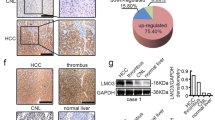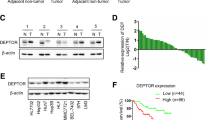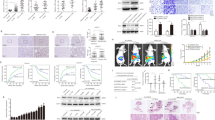Abstract
Objective
To investigate the effects of Pien Tze Huang (PZH) on the migration and invasion of HCC cells and underlying molecular mechanism.
Methods
Cell counting kit-8 (CCK-8) was applied to evaluate the cell viabilities of SMMC-7721, SK-Hep-1, C3A and HL-7702 (6 × 103 cells/well) co-incubated with different concentrations of PZH (0, 0.2, 0.4, 0.6, 0.8 mg/mL) for 24 h. Transwell, wound healing assay, CCK-8 and Annexin V-FITC/PI staining were conducted to investigate the effects of PZH on the migration, invasion, proliferation and apoptosis of SK-Hep-1 and SMMC-7721 cells (650 µ g/mL for SK-Hep-1 cells and 330 µ g/mL for SMMC-7721 cells), respectively. In vivo, lung metastasis mouse model constructed by tail vein injection of HCC cells was used for evaluating the anti-metastasis function of PZH. SK-Hep-1 cells (106 cells/200 µ L per mice) were injected into B-NDG mice via tail vein. Totally 8 mice were randomly divided into PZH and control groups, 4 mice in each group. After 2-d inoculation, mice in the PZH group were administered with PZH (250 mg/kg, daily) and mice in the control group received only vehicle (PBS) from the 2nd day after xenograft to day 17. Transcriptome analysis based on RNA-seq was subsequently used for deciphering anti-tumor mechanism of PZH. Quantitative real-time polymerase chain reaction (qRT-PCR) and Western blot were applied to verify RNA-seq results. Luciferase reporter assay was performed to examine the transcriptional activity of yes-associated protein (YAP).
Results
PZH treatment significantly inhibited the migration, invasion, proliferation and promoted the apoptosis of HCC cells in vitro and in vivo (P<0.01). Transcriptome analysis indicated that Hippo signaling pathway was associated with anti-metastasis function of PZH. Mechanical study showed PZH significantly inhibited the expressions of platelet derived growth factor receptor beta (PDGFRB), YAP, connective tissue growth factor (CCN2), N-cadherin, vimentin and matrix metallopeptidase 2 (MMP2, P<0.01). Meanwhile, the phosphorylation of YAP was also enhanced by PZH treatment in vitro and in vivo. Furthermore, PZH played roles in inhibiting the transcriptional activity of YAP.
Conclusion
PZH restrained migration, invasion and epithelial-mesenchymal transition of HCC cells through repressing PDGFRB/YAP/CCN2 axis.
Similar content being viewed by others
References
Marrero JA, Kulik LM, Sirlin CB, Zhu AX, Finn RS, Abecassis MM, et al. Diagnosis, staging, and management of hepatocellular carcinoma: 2018 Practice Guidance by the American Association for the Study of Liver Diseases. Hepatology 2018;68:723–750.
Yang JD, Hainaut P, Gores GJ, Amadou A, Plymoth A, Roberts LR. A global view of hepatocellular carcinoma: trends, risk, prevention and management. Nat Rev Gastroenterol Hepatol 2019;16:589–604.
Ishizawa T, Hasegawa K, Aoki T, Takahashi M, Inoue Y, Sano K, et al. Neither multiple tumors nor portal hypertension are surgical contraindications for hepatocellular carcinoma. Gastroenterology 2008;134:1908–1916.
Chen G, Cai Z, Li Z, Dong X, Xu H, Lin J, et al. Clonal evolution in long-term follow-up patients with hepatocellular carcinoma. Int J Cancer 2018;143:2862–2870.
Lim KC, Chow PK, Allen JC, Chia GS, Lim M, Cheow PC, et al. Microvascular invasion is a better predictor of tumor recurrence and overall survival following surgical resection for hepatocellular carcinoma compared to the Milan criteria. Ann Surg 2011;254:108–113.
Hsieh CH, Wei CK, Yin WY, Chang CM, Tsai SJ, Wang LY, et al. Vascular invasion affects survival in early hepatocellular carcinoma. Mol Clin Oncol 2015;3:252–256.
Zhang S, Zhou D. Role of the transcriptional coactivators YAP/TAZ in liver cancer. Curr Opin Cell Biol 2019;61:64–71.
Dwivedi N, Tao S, Jamadar A, Sinha S, Howard C, Wallace DP, et al. Epithelial vasopressin type-2 receptors regulate myofibroblasts by a YAP-CCN2-dependent mechanism in polycystic kidney disease. J Am Soc Nephrol 2020;31:1697–1710.
Shimo T, Nakanishi T, Nishida T, Asano M, Kanyama M, Kuboki T, et al. Connective tissue growth factor induces the proliferation, migration, and tube formation of vascular endothelial cells in vitro, and angiogenesis in vivo. J Biochem 1999;126:137–145.
Ivkovic S, Yoon BS, Popoff SN, Safadi FF, Libuda DE, Stephenson RC, et al. Connective tissue growth factor coordinates chondrogenesis and angiogenesis during skeletal development. Development 2003;130:2779–2791.
Wells JE, Howlett M, Cole CH, Kees UR. Deregulated expression of connective tissue growth factor (CTGF/CCN2) is linked to poor outcome in human cancer. Int J Cancer 2015;137:504–511.
Chen Q, Shu C, Laurence AD, Chen Y, Peng BG, Zhen ZJ, et al. Effect of Huai’er Granule on recurrence after curative resection of HCC: a multicentre, randomised clinical trial. Gut 2018;67:2006–2016.
Liao YH, Li CI, Lin CC, Lin JG, Chiang JH, Li TC. Traditional Chinese medicine as adjunctive therapy improves the long-term survival of lung cancer patients. J Cancer Res Clin Oncol 2017;143:2425–2435.
Qi F, Zhou S, Li L, Wei L, Shen A, Liu L, et al. Pien Tze Huang inhibits the growth of hepatocellular carcinoma cells by upregulating miR-16 expression. Oncol Lett 2017;14:8132–8137.
Lin J, Feng J, Jin Y, Yan Z, Lai Z, Peng J. Pien Tze Huang suppresses VEGF-C-mediated lymphangiogenesis in colorectal cancer. Oncol Rep 2016;36:3568–3576.
Lin W, Zhuang Q, Zheng L, Cao Z, Shen A, Li Q, et al. Pien Tze Huang inhibits liver metastasis by targeting TGF-beta signaling in an orthotopic model of colorectal cancer. Oncol Rep 2015;33:1922–1928.
Fu C, Chu J, Shen A, Liu L, Chen H, Lin J, et al. Pien Tze Huang alleviates 5-fluorouracil-induced intestinal mucositis in CT-26 tumor-bearing mice. Exp Ther Med 2017;14:2291–2297.
Zhao SL, Pan J. A clinical trial of combined use of Pien Tze Huang and chemotherapy in the treatment of primary liver cancer. Med World (Chin) 2006;2006:49–51.
Zhang X, Wang F, Huang Y, Ke K, Zhao B, Chen L, et al. FGG promotes migration and invasion in hepatocellular carcinoma cells through activating epithelial to mesenchymal transition. Cancer Manag Res 2019;11:1653–1665.
Zhao B, Ke K, Wang Y, Wang F, Shi Y, Zheng X, et al. HIF-1 alpha and HDAC1 mediated regulation of FAM99A-miR92a signaling contributes to hypoxia induced HCC metastasis. Signal Transduct Target Ther 2020;5:118.
Liu X, Fu Q, Bian X, Fu Y, Xin J, Liang N, et al. Long non-coding RNA MAPK8IP1P2 inhibits lymphatic metastasis of thyroid cancer by activating hippo signaling via sponging miR-146b-3p. Front Oncol 2020;10:600927.
Wang Y, Wang G, Tan X, Ke K, Zhao B, Cheng N, et al. MT1G serves as a tumor suppressor in hepatocellular carcinoma by interacting with p53. Oncogenesis 2019;8:67.
Wan Y, Shen A, Qi F, Chu J, Cai Q, Sferra TJ, et al. Pien Tze Huang inhibits the proliferation of colorectal cancer cells by increasing the expression of miR-34c-5p. Exp Ther Med 2017;14:3901–3907.
Chen H, Feng J, Zhang Y, Shen A, Chen Y, Lin J, et al. Pien Tze Huang inhibits hypoxia-induced angiogenesis via HIF-1 alpha/VEGF-A pathway in colorectal cancer. Evid-Based Complement Alternat Med 2015;2015:454279.
Wei L, Chen P, Chen Y, Shen A, Chen H, Lin W, et al. Pien Tze Huang suppresses the stem-like side population in colorectal cancer cells. Mol Med Rep 2014;9:261–266.
Zhang Y, Wang Q, Niu S, Liu J, Zhang L. Pien Tze Huang induces apoptosis in multidrug resistant U2OS/ADM cells via downregulation of Bcl2, survivin and P-gp and upregulation of Bax. Oncol Rep 2014;31:763–770.
Fu Y, Zhang L, Hong Z, Zheng H, Li N, Gao H, et al. Methanolic extract of Pien Tze Huang induces apoptosis signaling in human osteosarcoma MG63 cells via multiple pathways. Molecules 2016;21:283.
He F, Wu HN, Cai MY, Li CP, Zhang X, Wan Q, et al. Inhibition of ovarian cancer cell proliferation by Pien Tze Huang via the AKT-mTOR pathway. Oncol Lett 2014;7:2047–2052.
Ma XL, Shen MN, Hu B, Wang BL, Yang WJ, Lv LH, et al. CD73 promotes hepatocellular carcinoma progression and metastasis via activating PI3K/AKT signaling by inducing Rap1-mediated membrane localization of P110beta and predicts poor prognosis. J Hematol Oncol 2019;12:37.
Zhang X, Zhang Q, Huang L, Liu M, Cheng Z, Zheng Y, et al. Pien-Tze-Huang attenuates neuroinflammation in cerebral ischaemia-reperfusion injury in rats through the TLR4/NF-kappaB/MAPK pathway. Pharm Biol 2021;59:828–839.
Liu M, Zhang Y, Yang J, Zhan H, Zhou Z, Jiang Y, et al. Zinc-dependent regulation of ZEB1 and YAP1 coactivation promotes epithelial-mesenchymal transition plasticity and metastasis in pancreatic cancer. Gastroenterology 2021;160:1771–1783.
Huang Z, Zhou JK, Wang K, Chen H, Qin S, Liu J, et al. PDLIM1 inhibits tumor metastasis through activating Hippo signaling in hepatocellular carcinoma. Hepatology 2020;71:1643–1659.
Smoot RL, Werneburg NW, Sugihara T, Hernandez MC, Yang L, Mehner C, et al. Platelet-derived growth factor regulates YAP transcriptional activity via Src family kinase dependent tyrosine phosphorylation. J Cell Biochem 2018;119:824–836.
Steller EJ, Raats DA, Koster J, Rutten B, Govaert KM, Emmink BL, et al. PDGFRB promotes liver metastasis formation of mesenchymal-like colorectal tumor cells. Neoplasia 2013;15:204–217.
Shen YW, Zhou YD, Chen HZ, Luan X, Zhang WD. Targeting CTGF in cancer: an emerging therapeutic opportunity. Trends Cancer 2021;7:511–524.
Wu Y, Shi W, Tang T, Wang Y, Yin X, Chen Y, et al. miR-29a contributes to breast cancer cells epithelial-mesenchymal transition, migration, and invasion via downregulating histone H4K20 trimethylation through directly targeting SUV420H2. Cell Death Dis 2019;10:176.
Pastushenko I, Blanpain C. EMT transition states during tumor progression and metastasis. Trends Cell Biol 2019;29:212–226.
Giannelli G, Koudelkova P, Dituri F, Mikulits W. Role of epithelial to mesenchymal transition in hepatocellular carcinoma. J Hepatol 2016;65:798–808.
Matsumura T, Makino R, Mitamura K. Frequent downregulation of E-cadherin by genetic and epigenetic changes in the malignant progression of hepatocellular carcinomas. Clin Cancer Res 2001;7:594–599.
Zhu X, Zhong J, Zhao Z, Sheng J, Wang J, Liu J, et al. Epithelial derived CTGF promotes breast tumor progression via inducing EMT and collagen I fibers deposition. Oncotarget 2015;6:25320–25338.
Lun W, Wu X, Deng Q, Zhi F. MiR-218 regulates epithelial-mesenchymal transition and angiogenesis in colorectal cancer via targeting CTGF. Cancer Cell Int 2018;18:83.
Author information
Authors and Affiliations
Contributions
Tian Q and Cheng NM designed the experiments and drafted the manuscript. Luo ZY performed the analysis with constructive discussions and revised the manuscript. Yang Y, Liu WH, Chen W, Zhang XZ, Zhang XY and Zhuang QY carried out the experiments. Chen MS and Zhao BX contributed to the statistical analysis. Liu XL and Liu CS proofread the manuscript and provided technical support. Wang YC and Li Q designed and administrated the project, reviewed, and revised the manuscript.
Corresponding author
Ethics declarations
The authors declare that the research was conducted in the absence of any commercial or financial relationships that could be construed as a potential conflict of interest. Luo ZY and Liu CS declare that they have no financial and personal relationships with other people or organizations that can inappropriately influence this work. There is no professional of other personal interest of any nature or kind in any product, service and/or company that could be construed as influencing the position presented in, or the review of this paper.
Additional information
Supported by Joint Funds for Innovation of Science and Technology, Fujian Province (No. 2019Y9047), Joint Funds for Innovation of Science and Technology of Fujian Province (No. 2017Y9117), Young and Middle-Aged Talent Training Project of Fujian Provincial Health and Family Planning Commission (No. 2020GGA072), Natural Science Foundation of Fujian Province (No. 2020J011164, 2020J011170), Startup Fund for Scientific Research, Fujian Medical University (No. 2019QH1298), Science and Technology Plan Project of Fuzhou (No.2019-S-87) 1.
Electronic supplementary material
Rights and permissions
About this article
Cite this article
Luo, Zy., Tian, Q., Cheng, Nm. et al. Pien Tze Huang Inhibits Migration and Invasion of Hepatocellular Carcinoma Cells by Repressing PDGFRB/YAP/CCN2 Axis Activity. Chin. J. Integr. Med. 30, 115–124 (2024). https://doi.org/10.1007/s11655-022-3533-8
Accepted:
Published:
Issue Date:
DOI: https://doi.org/10.1007/s11655-022-3533-8




